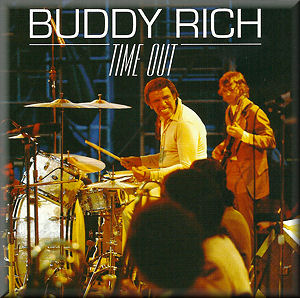1.
Goodbye Yesterday
2.
Machine
3.
Bouncin' With Bud
4.
Readymix
5.
Senator Sam
6.
Party Time
7.
Joy Spring
8.
Funk City/Ola
9.
Loose
10.
Time Out
11.
Chicago
Buddy Rich (Drums) with various personnel.
Big bands can be very exciting, although they can also be dreary - pumping out stock arrangements without much passion or enthusiasm. The big band which Buddy Rich formed in 1966 was different, for several reasons. The main asset was Buddy himself: not only a drummer of huge power and technique but also a fierce taskmaster who demanded only the best from his musicians. Instead of playing tired old arrangements, Buddy commissioned new arrangements from such experts as Bill Holman, Bob Mintzer and Don Menza, mostly arranging their own compositions. And Buddy assembled musicians with impeccable technique, able to tackle the sometimes demanding arrangements.
All these qualities are audible in this selection of tunes recorded in 1977/78 by Alan Gauvin, one of the band's saxophonists, who made a habit of recording the band. The very first track, Goodbye Yesterday, exemplifies another commendable quality in the band: dynamics. Buddy Rich could play loud and long if he wanted to, but his band was also capable of varying the dynamics from fortissimo to pianissimo. The tune is in a fast 6/8 tempo but the band has no trouble dealing with it. This track also shows how Buddy drove the band along with his sharp accents and propulsive drumming. Unlike many drummers whose left-hand accents on the snare drum are random, Buddy emphasises beats which match the rhythm of a tune.
Several items on this album were staples of the Rich bandbook, including Machine, Readymix and Chicago, but they are all played with the enthusiasm of a first performance. Buddy Rich's ensembles always had strong tenor sax soloists in their ranks. Bouncin' With Bud (composed by Bud Powell) has a long tenor solo from Gary Pribeck, with the band joining in occasionally to provide contrast. Senator Sam begins with a long piano solo which sets a placid mood. This makes it more effective when the ensemble comes in at full blast. Steve Marcus's tenor solo has a bassoon-like quality.
As a drummer myself, I often find myself open-mouthed at Buddy's dexterity on the drums. An example of this occurs towards the end of Clifford Brown's Joy Spring, where a short drum solo seems to achieve the impossible. At more than eleven minuites, the title-track is the longest cut on the album. It's a flag-waver which gives opportunities for extended solos by pianist Barry Kay, a saxist who might be Bob Mintzer (although he is not listed in the personnel), trumpeters Ross Konikoff and Dean Pratt, as well as Buddy himself - all excellent.
The personnel details are difficult to read, as they are printed
in small white type on a black background. As this album is taken
from what might be called amateur recordings, the quality of these
tracks is not always perfect, and the bass guitar is often too prominent.
Having said that, the sound and balance are surprisingly good. In
the sleeve-notes to Wham!, the previous collection of Alan
Gauvin's recordings of Buddy Rich, Alan says that he has 90 hours
of these tapes. How many more CDs can you get out of those?
Tony Augarde
www.augardebooks.co.uk
